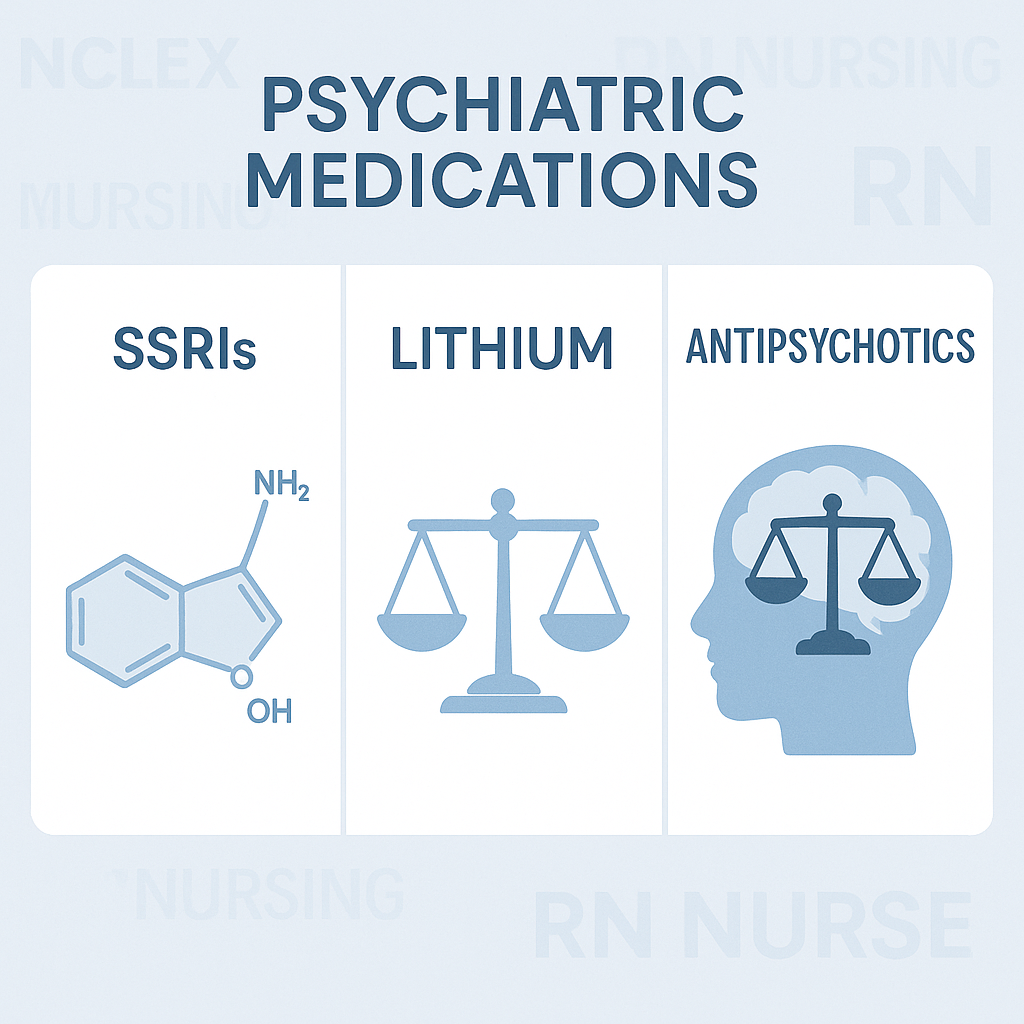Psychiatric medications can feel overwhelming for nursing students preparing for the NCLEX, but breaking them down into simple categories makes them easier to remember. Every nurse, whether a new graduate or an experienced registered nurse, will encounter psych meds in practice—so knowing the essentials of SSRIs, lithium, and antipsychotics is a must. This guide serves as a quick nursing reference and complements any nursing bundle of study resources.
🌿 SSRIs (Selective Serotonin Reuptake Inhibitors)
Examples: Fluoxetine (Prozac), Sertraline (Zoloft), Escitalopram (Lexapro).
- Uses: First-line treatment for depression and anxiety.
- Key Nursing Notes:
- Watch for serotonin syndrome (confusion, fever, sweating, tremors).
- Takes 2–4 weeks to work.
- Educate patients to avoid St. John’s Wort.
👉 For NCLEX prep: Remember “FLashy SERTain ESCape” = Fluoxetine, Sertraline, Escitalopram.
💊 Lithium
Use: Gold standard for bipolar disorder (mania control).
- Therapeutic Range: 0.6–1.2 mEq/L.
- Toxicity Signs: Tremors, confusion, seizures, vomiting, diarrhea.
- Nursing Priorities:
- Encourage adequate fluid and sodium intake.
- Monitor kidney function (BUN, creatinine).
- Teach patients to avoid dehydration.
👉 NCLEX Tip: “LiTHium = Levels Too High → toxicity risk.”
🧠 Antipsychotics
Typical Antipsychotics (First Generation)
Examples: Haloperidol, Chlorpromazine.
- Uses: Schizophrenia, acute psychosis.
- Side Effects: Extrapyramidal symptoms (EPS), tardive dyskinesia, neuroleptic malignant syndrome (NMS).
- Nursing Notes: Monitor for muscle rigidity + fever = possible NMS.
Atypical Antipsychotics (Second Generation)
Examples: Risperidone, Olanzapine, Clozapine.
- Uses: Schizophrenia, bipolar disorder, depression adjunct.
- Side Effects: Weight gain, metabolic syndrome, agranulocytosis (with clozapine).
- Nursing Notes: Monitor WBCs with clozapine.
👉 NCLEX Mnemonic: “Cloz-apine closes the WBCs.”
✅ Quick Comparison Chart
| Drug Class | Key Uses | Red Flags for Nurses | NCLEX Tip |
|---|---|---|---|
| SSRIs | Depression, Anxiety | Serotonin Syndrome | Watch for confusion + fever |
| Lithium | Bipolar Disorder | Toxicity if dehydrated, low sodium | Monitor levels (0.6–1.2) |
| Antipsychotics | Schizophrenia, Psychosis | EPS, NMS, agranulocytosis (clozapine) | WBC checks with Clozapine |
🩺 The Nurse’s Role
Every RN nurse must recognize side effects early, educate patients on adherence, and monitor labs where needed. Safe psych med administration is a key part of nursing practice and heavily tested on the NCLEX. Keeping a nursing bundle of drug charts, mnemonics, and quick guides can make exam prep and real-world practice much smoother.
🔑 Final Thoughts
Psych meds don’t have to be confusing. By focusing on SSRIs, lithium, and antipsychotics, a registered nurse can confidently support patients and ace the NCLEX. Use this guide as a quick-reference “cheat sheet” to keep your nursing knowledge sharp.

